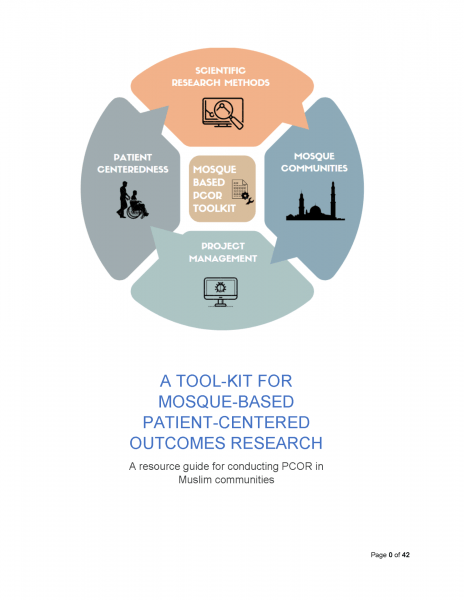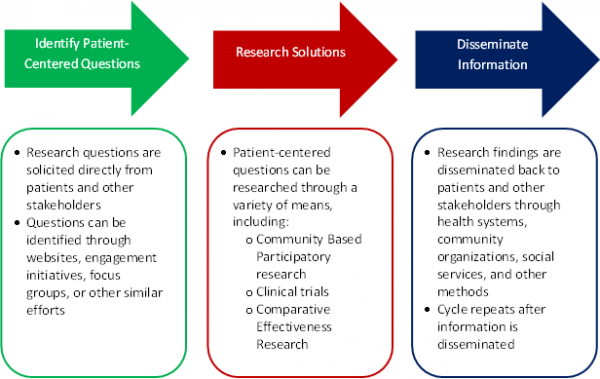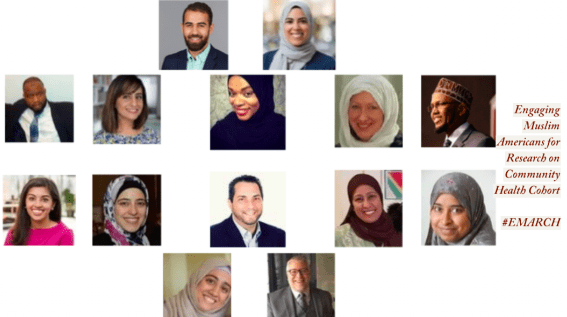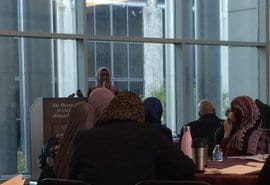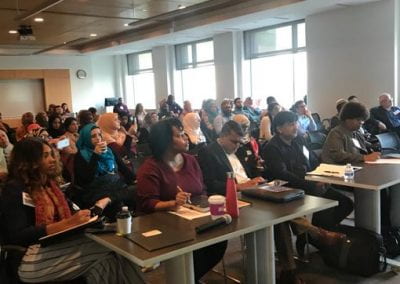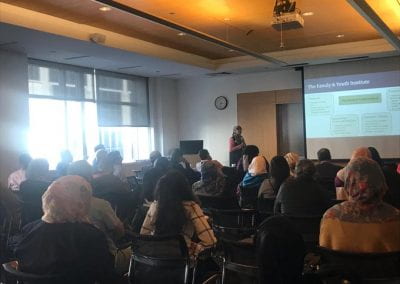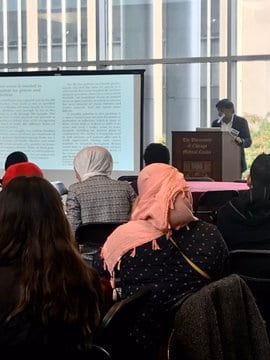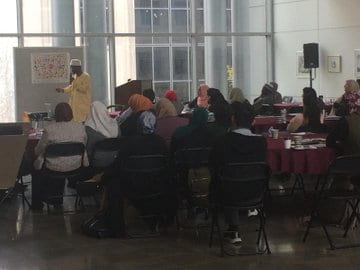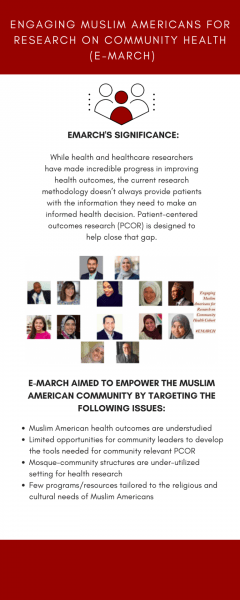Engaging Muslim Americans for Research on Community Health (E-MARCH)
Project Outputs
Meet the Cohort
Since August 2018, the E-MARCH cohort has diligently worked to develop the knowledge, skills, and networks required to effectively engage in Muslim community-relevant patient-centered outcomes research. Through engagement in a learning institute, participation in webinars and group discussions, and the development of their leadership projects, the group has outlined the top Muslim health issues that are amenable to patient-centered outcomes research.
EMARCH Project Updates
Advancing Muslim American Health Priorities Conference
A-MAP is the culmination E-MARCH through which a cohort of religious leaders, community health and social service workers, researchers, physicians, and patients from across the United States identified key community health research priorities for Muslim Americans. This conference provided a venue to examine these priorities by bringing together diverse stakeholders to discuss mosque-based, patient-centered approaches to addressing the religious dimensions of mental, reproductive, and sexual health disparities.
Public Pieces
Whitepaper
The growing complexity of the American healthcare system and continued existence of health and healthcare inequities has spurred leading institutes and funders to develop novel methods and enhanced strategies by which to conduct, implement, and disseminate health outcomes research. Central to these efforts has been the focus on bringing value to patients by measuring outcomes of import to them, and on partnering with stakeholders across multiple sectors including the healthcare industry, community-based organizations, policy makers, and the academy so that health research and programming is better situated to the broader contexts of healthcare delivery within the US. This toolkit leverages these resources in bringing PCORI methods and tools to bear upon Muslim American community health through the venue of mosque communities.
Cohort Project Updates (A-J)
Heba Abolaban
Dr. Abolaban is a very passionate Muslim public health physician who obtained her medical degree from Damascus University school of medicine in Syria, then got her Master degree of Public Health from Northeastern University in Boston, MA. Over the past 4 years, Dr. Abolaban has been providing cultural competency training on how Islam shapes Muslim American health for over 700 healthcare professionals at various health centers and hospitals in Massachusetts. Currently, Dr. Abolaban is working part time at the Muslims & Mental Health Lab at Stanford University as a lab manager and researcher. Her research focuses on studying Muslim refugees mental health as well as the history of mental health and psychology in Islam.
Sameera Ahmed
Dr. Sameera Ahmed is the Director of the Family & Youth Institute. The Family and Youth Institute (The FYI) is a non-profit organization that strengthens and empowers individual, families, and communities through research and education efforts. These efforts are tailored to the needs of the American Muslim community and focus on promoting positive youth development, healthy marriages, effective parenting, and improving mental health. She holds a Ph.D. in Clinical Psychology and specializes in American Muslim youth and Muslim Mental health. She also serves as an Associate Editor for the Journal of Muslim Mental Health (JMMH) and is a Board certified Licensed Psychologist in Ohio and Michigan.
- Tahseen, M., Ahmed, S. R., & Ahmed, S. (2019). Muslim Youth in the Face of Islamophobia: Risk and Resilience. In Islamophobia and Psychiatry (pp. 307-319). Springer, Cham.
- Ahmed S. & Muhammad H. (2019) Black Muslim Youth: Navigating their environment, while brokering new pathways (pp. 23-51). In Abbas, T. and Hamid, S., (Eds.) Political Muslims: Understanding Youth Resistance in the Global Context, Syracuse University Press: Syracuse, NY.
- Navigating Ethical Dilemmas in Providing Mental Health Care for Muslim Youth at American Academy of Child and Adolescent Psychiatry’s 66th Annual Meeting
Angelica Lindsey-Ali
Angelica Lindsey-Ali aka The Village Auntie™ is a recognized expert in sexual health, intimacy cultivation in Islamic marriage, and emotional well-being. She is a member of the E-March cohort where her research centers on the development of a religiously focused and culturally centered sexual health curriculum. Angelica offers workshops and resources on love, intimacy, traditional approaches to sexuality, and feminine gender identity within the framework of traditional West and East African societies. She also facilitates in-person and online rites of passage programs for girls and young women. Angelica has been a featured presenter at events hosted by Masjid Quba, the Islamic Social Services Association, Muslim Wellness Foundation, Arizona State University, Arizona Department of Health Services, Delta Sigma Theta Sorority Inc., Maricopa County Health Department, HEAAAL Coalition, Life Paradigms, Inc., Howard University, and Princeton University, to name a few. The focus of Angelica’s work is to re-examine the critical role of woman-to-woman communication as well as age-grade societies as a tool for dissemination of not only practical sexual knowledge from an Islamic framework but as a portal for the modeling of femininity, positive body image, and the rightful role of women as pillars of family and community.
- Black Muslim Psychology Conference, July 2019
Behind Closed Doors: Love & Intimacy in Islam - Black Muslim Psychology Conference, July 2019
The Duafe Sisterhood and Akoben Brotherhood: Developing Traditional Rites of Passage for Black Muslim Youth - Black Muslim Psychology Conference, July 2019
“Get That O, Sis” - Arizona State HIV Symposium, August 2019
- “Lights On” Amaliah Magazine, September 2019
Podcast series on faith and sexuality
Yasser Aman
Dr. Yasser Aman served as the founding CEO of the UMMA Community Clinic for 15 years. During that time he pursued his masters and doctorate in health policy with a focus on healthcare disparities for vulnerable populations. Dr. Aman was also the co-principle investigator, in partnership with the UCLA School of Public Health, for the nation’s first Muslim breast cancer study. He currently serves as the Chief of Medical Campus Integration at Los Angeles County Martin Luther King Outpatient Center and as a health policy assistant professor at both USC and Charles R. Drew Medical School. He enjoys teaching and engaging students around real health policy implications for underserved communities.
Mohammad Aref
Mohammad Aref is an MD/PhD candidate at the IU School of Medicine. He studied Biomedical Engineering as an undergraduate and worked in medical product development in both research and clinical settings. His PhD research focuses on combining biomechanics, blood flow and imaging with bone and mineral metabolism in an effort to understand the interaction between bone and other organ systems in disease. He has a passion for service – specifically, the provision of quality, accessible services to his neighbors. He currently serves as the Chair Elect of the Indiana University Outreach Clinic, volunteers regularly in free clinics in Indianapolis, and is in the process of founding a new free clinic in the near-northeast side of Indianapolis. Mohammad hopes to utilize community health programs to care for his neighbors and take part in meaningful social change.
Alia Azmat
Alia Azmat is a Ph.D student in Counseling Psychology at Purdue University focusing on identity, culture, mental, and reproductive health. She investigates definitions of womanhood, objectification theory, spiritually-integrated therapy, and stigma reduction from an feminist-intersectional lens. She is also passionate about qualitative methodology and program evaluation. In addition to her research and clinical work, she is an educator for HEART Women & Girls Project. Alia hopes to work with men and women in the community to develop and increase access to culturally-relevant health education resources. She received her B.A in Global Health from Arizona State University and considers herself an transdisciplinary learner in anthropology, psychology, education, and public health.
- National Multicultural Summit, January 2019
Girls should be seen not heard: self-silencing and self-objectification in Muslim American women (poster presentation) - Muslim Mental Health Conference, April 2019
Girls should be seen not heard: self-silencing and self-objectification in Muslim American women (oral presentation) - Muslim Mental Health Conference, April 2019
Sexual assault beliefs in Muslim college-aged students (oral presentation) - Responding with RAHMA: Removing Roadblocks for Muslim Survivors, June 2019
Trauma and Mental Health - American Psychological Association, August 2019
Faithful Activism: How religion and social justice work together (panel presentation)
Mona Elgohail
Mona Elgohail, PhD is a clinical psychologist who specializes in reproductive and perinatal mental health. She is currently completing a postdoctoral research fellowship in perinatal mental health at Drexel University within the Mother Baby Connections program. She received her BA in Neuroscience & Behavior from Barnard College, Columbia University in New York. She received her MS and PhD in clinical psychology from Drexel University in Philadelphia, and completed her predoctoral internship in clinical health psychology at Rush University Medical Center in Chicago. Since founding the Muslim Fertility Project in 2016, Dr. Elgohail has launched multiple award-winning international research studies focused on understanding and addressing the psychosocial needs of Muslim women experiencing infertility. She was the first to quantify the high prevalence of stress and depression in this extremely understudied population. Her research also led to the first online Islamically Integrated Cognitive Behavioral Therapy (IICBT) program to reduce depressive symptoms among Muslim women experiencing infertility.
Cohort Project Updates (K-Z)
Amal Killawi
Amal Killawi is a clinical social worker, researcher, and community educator, and is pursuing her PhD in Social Work at Rutgers University. She is a research fellow with The Family & Youth Institute and scholar with the Institute for Social Policy & Understanding. Amal holds a Bachelors in Psychology, Masters in Social Work, and a Certificate in Sexual Health from the University of Michigan. Her previous experiences include working as a counselor with college students and domestic violence survivors, conducting research on family and health challenges in American Muslim communities, and serving as an online counselor and writer. Her research interests focus on help-seeking behaviors and culturally competent care.
- The FYI Marriage Prep Toolkit
- 11th Annual Muslim Mental Health Conference, April 2019
Are we preparing Muslim couples for marriage? Lessons learned from marriage prep research and education in Muslim communities
Nasir Malim
Nasir is currently a 4th year medical student at TouroCOM-Middletown in New York and part of the EMARCH Cohort for the year. He recently matched into residency in Internal Medicine at Montefiore Medical Center’s program in Primary Care Social Medicine, one of the few residency programs in the country that merge a more humanities based and social justice mission along with medical residency. He believes it is important to understand long term and chronic health impacts of social and political discrimination toward Muslim communities and hopes for his project to make progress toward this goal.
- Islamic Bioethical Perspectives on Gender Identity for Intersex Patients Preserving Life Conference
- This is why the humanities are important in medicine
- Health care professionals who fast and celebrate the month of Ramadan
Fatema Mirza
As a certified Project Manager, Fatema Mirza has initiated and led several community health projects in past 12 years and provided healthcare and IT consultation to health care entities on electronic medical records, Accountable Care/Managed Care regulations, JCAHO and Medicare accreditations. Her team of ACA Navigators and health coverage counselors has been enrolling the uninsured in Obamacare and providing resources for underserved in since 2013 and continue to serve the states of Illinois, Texas and New York. She helped set up Senior Health Insurance Program sites for faith based and community-based organizations and designed Community health training programs to support the projects in mosque communities. She has been a co-founder of several organizations including Worry Free Health, Max Care Home Health Services, Max Health Network and Worry Free Community (WFC)
Samaiya Mushtaq
Dr. Mushtaq is currently on the clinician-educator track at UT Southwestern in Dallas, Texas, where she provides outpatient treatment and therapy to patients with psychiatric illness. She conducts research on help-seeking behaviors and wellness in Muslim Americans and has designed and taught curricula integrating Islamic spirituality with evidence-based concepts in mental wellness to college MSAs, young professional Muslim groups, and community organizations. Dr. Mushtaq has also started a cross-department network supporting and connecting Muslim housestaff at UT Southwestern. Her work has been presented at her departmental Grand Rounds at UT Southwestern, AADPRT, and the annual Conference on Medicine and Religion. She has also authored a chapter on Islamophobia experienced by clinicians in the forthcoming book, Islamophobia and Psychiatry.
Nancy Romanchek
Nancy Romanchek is Registered Nursed Certified in Hospice and Palliative Care with a decade of Case Management experience. She is on the Executive Board of the Hospice and Palliative Care Nurses Association, Chicagoland Chapter. Nancy is a Faith Community Nurse(FCN) through the Advocate Health System Network, having trained at Marquette University and has extensive experience in the Catholic setting in this capacity. She has engaged in numerous projects in the Muslim community including initiating a partnership with the Lutheran School of Theology to provide workshops to Chaplains around the Chicago area to prepare them to minister to their Muslim patients.
Mohammad Sackor
Muhammed Sackor is originally from Liberia but grew up in Saudi Arabia. He studied at the Islamic University of Madinah at the Faculty of Islamic Law. After graduating in 2007, he moved to Omaha-Nebraska to study at Creighton University pursuing his first Master’s degree (MA) in Liberal arts. In 2017, he pursued a second Master’s in International Security at Bellevue university. Currently, he is working on his third Master’s degree at Guidance College in Islamic Banking and Finance while also serving as a full time Imam at the Islamic Center of Omaha and working at United States Department of Commerce as Partnership Specialist with the Census.
Michael VanKeulen
Dr. Michael Van Keulen is Cofounder and Partner in Open Path Resources (OPR). OPR, with support from the Catalyst Initiative at The Minneapolis Foundation, is the recipient of a $209,000 Bush Foundation Community Innovation grant to develop the Midwest’s first Muslim chaplaincy program. The two-year program will train 40 Muslim community leaders – both men and women – in OPR’s pilot pre-Clinical Pastoral Education (CPE) courses, customized for the Muslim faith. Once trainees complete the pilot course, OPR will coach them through the traditional CPE training. CPE is a hospital-based model that trains candidates to serve as interfaith ministers in hospital, hospice, senior living, or other healthcare settings. Additionally, the program aims to support Muslim candidates ministering in prisons, universities, police departments and other chaplaincy roles.
Opening Plenary
Dr. Aasim Padela welcomes attendees by giving an introduction about #EMARCH cohort and themes for the conference.
Poster Viewing Session
Tumblers displayed on registration table beside posters of projects accepted for poster viewing session.
Engaging Mosque Communities
Drs. Rania Awad and Sara Ali present research on, “Engaging the Bay Area Muslim Community in Mental Health.”
Engaging Mosque Communities
Fatima Saifi, a Research Coordinator at Northwestern presenting her work on collaborating with a school district to educate &engage South Asian Muslim Immigrant’s to participate in cardiovascular disease prevention.
Mental Health
PsyD Candidate at Chicago School of Professional Psychology, Farhad Syed, presenting results from his study,”A Survey of Islamic Clergy and Community Leaders Regarding Mental Health First Responder Training.”
Mental Health
Johns Hopkins University Medical Student, Awa Sanneh, presenting her research on exploring disparities in cancer screening behavior among Muslim women.
Shark Tank Panelists
Live Health Research Shark Tank Panelists. Our #EMARCH cohort presented their research projects to leading funding centers aimed at funding patient centered community based health research projects!
Shark Tank Proposals
Mona Elgohail, PhD presenting preliminary results from her fertility project, “An Innovative Internet-Based Treatment to Reduce Depressive Symptoms in Muslim Women Experiencing Infertility.
Shark Tank Proposals
Mohammad Aref, MD/PhD(c) presenting his findings from his project, “Studying Religion Associated Disparities in Mental Health for American Muslims.”
Shark Tank Proposals
Alia Azmat, PhD(c) presenting her sexual health study, “The Burden of Sexual Violence and Sexual Dysfunction in Muslim Communities.”
Shark Tank Proposals
Heba Abolaban, MD/MPH presenting her project, “Increasing Breast Cancer Screening Rates Among Foreign Born American Muslim Women in the South Bay Area, CA.”
Shark Tank Proposals
Angelica Lindsey-Ali, presenting her project proposal on ” Developing an Islamically Centered Sexual Health Curriculum for Black Muslim Women.”
Shark Tank Proposals
Sameera Ahmed, PhD and Director of The FYI presenting her mental health project, “Positive Youth Development: Pilot Intervention with American Muslims.”
Reception Keynote
Inspiring keynote by IMAN’s Executive Director, Rami Nashashibi, on how we can collaborate as researchers & community health organizers to bring about social change.
Conference Keynote Address
Inspiring keynote by Edinburgh University Professor and Usher Center Director, Aziz Sheikh, on Conducting Muslim Health Research.
Sexual and Reproductive Health Panel
Nadiah Mohajir, MPH, Director of HEART Women and Girls, presenting, “Understanding the Reproductive Health Needs of Muslim American Women.”
Sexual and Reproductive Health Panel
Rosie Duivenbode, MD, MSc presenting, “American Muslim Attitudes Towards Common Fertility Treatment Options: A Mosque-Based, Cross-Sectional Study.”
Sexual and Reproductive Health Panel
Hager Shawkat, MPH from Sauti Yetu Center for African Women presenting, “Tailoring Sexual Health and Family Planning Conversations for African and Muslim Youth in New York City.”

